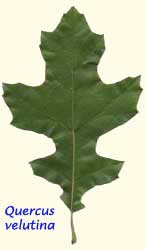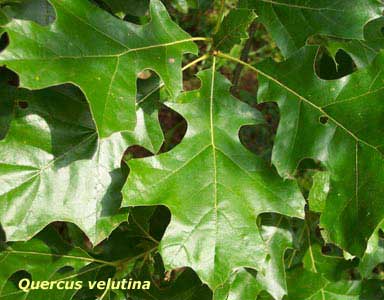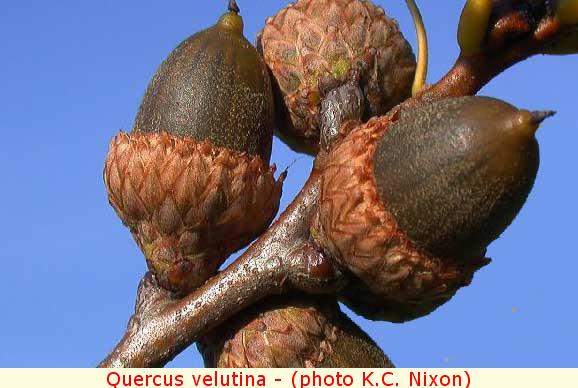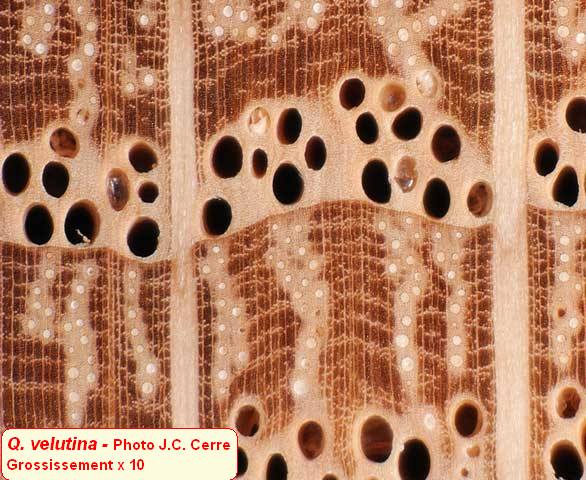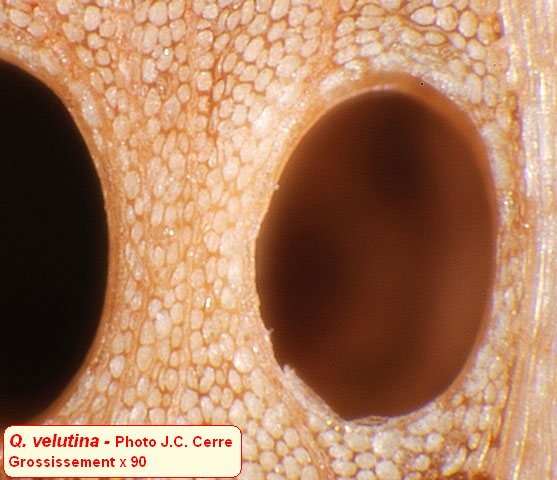| Quercus velutina | |
| Author | Lam. 1785 Encycl. 1: 721 |
| Synonyms | coccinea var. tinctoria (W.Bartram) A.DC
1864 discolor Aiton 1789 missouriensis Ashe 1917 magnifica Dippel 1891 nigra Du Roi not L. rubra var. tinctoria (W.Bartram) Kuntze 1891 tinctoria W. Bartram 1794 valentina Lam. ex Steud. 1821 velutina var. missouriensis (Ashe) Sarg. 1922 velutina f. missouriensis (Ashe) Trel. 1924 |
| Local names | black
oak ;
yellow barked oak ; smoothbark oak ; |
| Range | Eastern
USA; to 1500 m; introduced in Europe in 1800; |
| Growth habit | 20-30
m tall; trunk to 1 m in diameter and more; crown open, narrow; spreading
branches; |
| Leaves | 10-23 x 7.5-15 cm; leathery; apex pointed; base cuneate; margin with 5-9 broad bristle-tipped lobes (the terminal two are often unequal, or there are 2 terminal lobes), with deep sinuses U-shaped; both sides shiny; dark green above; paler beneath with yellowish brown pubescence, sometimes only with tufts of hairs at vein axils; stout yellow petiole 4-6 cm long; |
| Flowers | spring |
| Fruits | acorn 1.5-2 cm long; ellipsoid; enclosed 1/2 by thick, bowl-shaped cup with loose, rusty brown scales; maturing in 2 years; |
|
Bark, twigs and |
bark dark grey, with orangish furrows, thick; bitter; twigs red brown; terminal bud 6-12 mm, pentagonal in cross-section, grey pubescent; |
| Hardiness zone, habitat | hardy; prefers sandy, lime-free soils, even dry ones; fast-growing; |
| Miscellaneous | -- "velutina" refers
to the velutinous surface of young leaves; -- A.Camus : n° 424; -- Sub-genus Quercus, section Lobatae, Series Coccineae; -- The name "valentina" has been used to name different species : Q.valentina Cav. 1793 = Q.fruticosa Q.valentina K.Koch 1849 = Q.infectoria Q.valentina Lam. ex Steudel 1821 = Q.velutina |
| Subspecies and varieties |
numerous hybrids, among them
: x bushii = with Q.marilandica ; x paleolithicola = with Q.ellipsoidalis ; x willdenowiana = with Q.falcata ; x rehderi = with Q.ilicifolia ; x leana = with Q.imbricaria ; x cocksii = with Q.laurifolia ; x vaga = with Q.palustris ; x filialis = with Q.phellos ; |
| Pictures |
|
